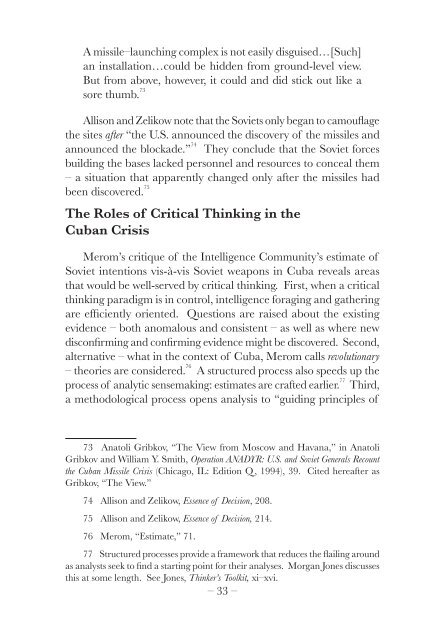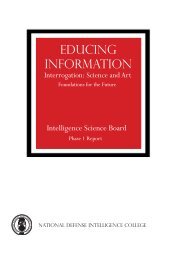Critical Thinking and Intelligence Analysis
Critical Thinking and Intelligence Analysis
Critical Thinking and Intelligence Analysis
Create successful ePaper yourself
Turn your PDF publications into a flip-book with our unique Google optimized e-Paper software.
A missile–launching complex is not easily disguised…[Such]<br />
an installation…could be hidden from ground‐level view.<br />
But from above, however, it could <strong>and</strong> did stick out like a<br />
sore thumb. 73<br />
Allison <strong>and</strong> Zelikow note that the Soviets only began to camouflage<br />
the sites after “the U.S. announced the discovery of the missiles <strong>and</strong><br />
announced the blockade.” 74<br />
They conclude that the Soviet forces<br />
building the bases lacked personnel <strong>and</strong> resources to conceal them<br />
– a situation that apparently changed only after the missiles had<br />
been discovered. 75<br />
The Roles of <strong>Critical</strong> <strong>Thinking</strong> in the<br />
Cuban Crisis<br />
Merom’s critique of the <strong>Intelligence</strong> Community’s estimate of<br />
Soviet intentions vis-à-vis Soviet weapons in Cuba reveals areas<br />
that would be well-served by critical thinking. First, when a critical<br />
thinking paradigm is in control, intelligence foraging <strong>and</strong> gathering<br />
are efficiently oriented. Questions are raised about the existing<br />
evidence – both anomalous <strong>and</strong> consistent – as well as where new<br />
disconfirming <strong>and</strong> confirming evidence might be discovered. Second,<br />
alternative – what in the context of Cuba, Merom calls revolutionary<br />
– theories are considered. 76 A structured process also speeds up the<br />
process of analytic sensemaking: estimates are crafted earlier. 77<br />
Third,<br />
a methodological process opens analysis to “guiding principles of<br />
73 Anatoli Gribkov, “The View from Moscow <strong>and</strong> Havana,” in Anatoli<br />
Gribkov <strong>and</strong> William Y. Smith, Operation ANADYR: U.S. <strong>and</strong> Soviet Generals Recount<br />
the Cuban Missile Crisis (Chicago, IL: Edition Q, 1994), 39. Cited hereafter as<br />
Gribkov, “The View.”<br />
74 Allison <strong>and</strong> Zelikow, Essence of Decision, 208.<br />
75 Allison <strong>and</strong> Zelikow, Essence of Decision, 214.<br />
76 Merom, “Estimate,” 71.<br />
77 Structured processes provide a framework that reduces the flailing around<br />
as analysts seek to find a starting point for their analyses. Morgan Jones discusses<br />
this at some length. See Jones, Thinker’s Toolkit, xi–xvi.<br />
– 33 –
















